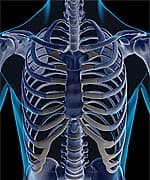Life Extension Magazine®
Mainstream medicine focuses almost exclusively on prescription drugs to reduce the risk of osteoporosis in aging men and women. What many people do not know is that the most popular class of prescription medications used to treat osteoporosis, bisphosphonates, focus on limiting additional bone loss, rather than actually building more bone, in aging men and women. This class of drugs is also associated with potentially serious side effects, including heart arrhythmia. Exciting scientific research has discovered the power of collagen for supporting optimal bone tensile strength. New data suggest that a unique, patent-pending nutritional supplement consisting of collagen chelated to calcium, along with a new plum extract can help support strong, resilient bones. The Osteoporosis EpidemicToo often, osteoporosis is diagnosed late in its progression resulting in rapidly declining bone integrity that leads not only to disfigurement but also painful and potentially lethal fractures. Today’s epidemic of osteoporosis causes up to half of all women over age 50 and one in four men in the United States to suffer disabling bone fractures.1 When an elderly person slips or loses their balance, it could mean the end of their life, since up to 20% of those who sustain a hip fracture die within one year.2 Since an estimated 250,000 Americans suffer a hip fracture annually, broken hips may lead to 50,000 deaths per year in the US alone.2 Sadly, very few doctors focus on preventing this silent disease through lifestyle adjustment such as weight-bearing exercise, bioidentical hormone replacement (if indicated), and broad-spectrum nutritional supplementation to feed and nurture healthy bone. Instead, pharmaceutical companies push bisphosphonate drugs (such as Fosamax® and Actonel®) as a one-stop solution. These drugs work by reducing bone resorption, not by building new bone directly. Of interest, evidence suggests these medicines are associated with potentially serious side effects.3-5 Few doctors understand that even when these drugs are used to reduce the risk of fracture secondary to breast or prostate cancer metastasis to bone,6 it is critical that patients also take a full complement of bone-building minerals along with these medications for optimal benefit.
The Power of Collagen
Recent advances in understanding normal bone structure and function have revolutionized the nutritional approach to optimizing bone health. Researchers are now discovering the vital importance of collagen for achieving optimal bone tensile strength. Most people will be very surprised to know that collagen, a resilient type of protein molecule, makes up most of the structure of bone.7 The spongy matrix of collagen fibers and crystalline salts within bone is crucial to absorbing compression forces to resist stress fractures,8 much as the tensile supports of steel bridges provide flexibility so that the bridge can withstand gale force winds and heavy traffic. Amazingly, the compressional strength of bone is even greater than that of reinforced concrete.9 Many fractures, however, result from twisting or torsional forces, and neither bone nor concrete has a very high degree of torsional strength. However, the dynamic collagen matrix within healthy bone allows it to better redistribute and deflect a variety of forces, thereby reducing fracture risk. Like suspension cables on a bridge that sway to absorb forces that might otherwise disrupt the main structure, collagen fibrils within bone are made up of strings of alternating collagen molecules and hydroxyapatite crystals that are connected by weak chemical bonds within the strings and between them.10 Force applied to collagen fibrils in bone causes some of these weak bonds to break. This is actually a beneficial action because by allowing stretching within the collagen matrix to spread the pressure over a broader area, the result is a protective effect on stronger bonds within the collagen molecule itself.7,10 Without both collagen and minerals, bone becomes brittle and can be easily fractured, much as a bridge with a missing cable could snap under the weight of one too many cars.
A New Type of CalciumAs we have seen above, bone strength and resilience depends on collagen fibers, as well as calcium, several trace minerals, and vitamins D and K2, which act together to generate a strong, complex matrix structure. Most bone supplements recommended by doctors contain only calcium, an inadequate nutritional strategy for optimal bone health.
Recently, scientists have developed a new form of calcium that molecularly binds collagen. Named KoAct™, this unique form of collagen calcium chelate is designed to enhance collagen support and turnover while increasing bone mineral density and bone strength.11 Scientists at the prestigious Tokyo University found that supplementation with collagen calcium chelate improved bone strength to a greater extent than the same amounts of calcium and collagen either given separately or together but in a non-chelated form. Specific improvements with collagen calcium chelate were seen not only in bone mineral density but just as importantly in femur (thigh bone) weight, bone collagen production, and bone flexibility and strength.11 In an experimental model of osteoporosis, the test group received a low-calcium diet for one week. In addition to their low-calcium diet, some of the test group consumed a high-dose collagen calcium chelate. The cohort receiving high-dose collagen calcium chelate had an increase in femur bone weight by an impressive 9.6%, compared with the group given the same amount of calcium in non-chelated form. The test group receiving the collagen calcium chelate had dose-dependent increases in bone mineral density, which were 3.5% to 11.1% higher than those seen in the group receiving the same amount of non-chelated calcium. The investigators concluded that collagen calcium chelate had an additive effect on bone mineral density, better than that of calcium alone or of a simple calcium and collagen mixture.12 Collagen calcium chelate was also associated with increases in femur bone strength, by about 9.9% to 25%, compared with the group receiving the same amount of calcium.12 Remarkably, the benefits of collagen calcium chelate were evident after only eight weeks of supplementation! Given these encouraging results, a large clinical study is planned for next year, in collaboration with the US Army, to look at the effect of collagen calcium chelate on bone fractures in hard-training recruits.
Plum Extract Supports Bone HealthNew research has shown that plum extract can be an important component of an intelligent bone health program. In a study of 58 postmenopausal women,13 those who were randomly assigned to receive 100 grams of a concentrated plum product in their daily diet for three months were shown to have positive effects on bone. These women showed significantly increased serum levels of biological markers that reflected greater rates of bone formation.13 Laboratory studies also demonstrated that concentrated plum polyphenols down-regulate (decrease) cellular signals that cause bone resorption.14,15
Plum polyphenols promote bone deposition by increasing osteoblast (bone-building cell) activity and function via their effects on increasing certain cell-signaling compounds and by enhancing expression of an enzyme that is involved in collagen cross-linking.16 In an experimental model of bone loss caused by surgical removal of the testicles, adding dried plum extract to the diet had similar effects to parathyroid hormone (PTH), which is involved in bone metabolism.17 The test group given concentrated plum extract had an 11% increase in vertebral (spine) and femoral (thigh bone) bone mineral density compared with controls, whereas those receiving PTH had increased bone mineral density by 20.7% at the vertebrae and 17.9% at the femur. Other changes in bone volume and structure seen with concentrated plum extract relative to controls were similar to those seen with PTH.15,17 Even more compelling, experimental studies18 suggest that bone changes previously thought to be irreversible can, to a great extent, be improved by dried plum extract. In an experimental model of postmenopausal osteoporosis, the test group that already had deterioration of bone structure had improvements, relative to controls, after two months of a diet containing dried plum extract. Femoral and tibial bone densities were restored and lumbar bone density was increased. Improved bone quality also resulted in a 6.9% improvement in overall yield and a 6.0% improvement in ultimate force. The architectural microstructure of trabecular bone was also significantly improved in rats receiving dried plum extract compared with controls.18 Standardized plum extracts provide a convenient way to obtain plum’s beneficial bone-supportive properties—without the concentrated calories and sugar content.
Clinical Considerations for Bone HealthCollagen calcium chelate, magnesium, silicon, boron, dried plum extract, and vitamins D and K2 work to synergistically support bone health. Individuals who may derive particular benefit from supplementation with these nutrients include those at risk of threats to bone strength, such as those with a family history of osteoporosis and advanced age. For optimal bone strength, a comprehensive approach using a variety of nutrients is essential. Collagen calcium chelate and concentrated plum extract are two powerful additions for men and women focused on having healthy bones that last a lifetime! If you have any questions on the scientific content of this article, please call a Life Extension Wellness Specialist at 1-800-226-2370. | ||||||||||||
| References | ||||||||||||
|





